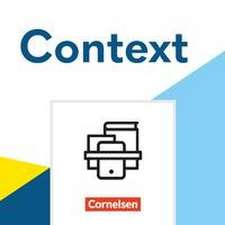Evaluation Methods in Research: Continuum Research Methods
Autor Dr Judith Bennetten Limba Engleză Paperback – 30 noi 2003
Preț: 219.98 lei
Preț vechi: 273.28 lei
-20% Nou
Puncte Express: 330
Preț estimativ în valută:
42.09€ • 44.06$ • 35.03£
42.09€ • 44.06$ • 35.03£
Carte tipărită la comandă
Livrare economică 01-15 aprilie
Preluare comenzi: 021 569.72.76
Specificații
ISBN-13: 9780826464781
ISBN-10: 0826464785
Pagini: 118
Dimensiuni: 156 x 234 x 13 mm
Greutate: 0.14 kg
Editura: Bloomsbury Publishing
Colecția Continuum
Seria Continuum Research Methods
Locul publicării:London, United Kingdom
ISBN-10: 0826464785
Pagini: 118
Dimensiuni: 156 x 234 x 13 mm
Greutate: 0.14 kg
Editura: Bloomsbury Publishing
Colecția Continuum
Seria Continuum Research Methods
Locul publicării:London, United Kingdom
Cuprins
1) What is Educational Evaluation?
Introduction: definitions and terminology
-What is evalution?
-Why undertake evaluation?
-Who is evaluation for?
-Dimensions of evaluation
-What is the relationship between evaluation and research?
2) Modals and approaches in educational evaluation
-Approaches and models in educational evaluation
-Two overviews
-The Classical research model
-The illuminative evaluation model
-Other models of evaluation
-Ways of characterising research and evaluation questions
-The politics of educational evaluation
-Recent trends and developments in educational evaluation
3) Innovation and models of change
-Introduction
-The Concerns-Based Adoption Model
-John Harland and Kay Kinder: a typology of continuinh professional development outcomes
4) Research strategies and techniques for educational evaluation
-Quantitative and qualitative data
-Research strategies and techniques
-Experiments as a research strategy in educational evaluation
-Case studies as a research strategy in educational evaluation
-Design experiments as a research strategy in educational evaluation
-Research techniques in educational evaluation
-The case study for a multi-method approach
5) Planning and doing an evaluation
-Key questions when planning and undertaking an evaluation
-What is being evaluated?
-What form will the evaluation take?
-What pratical issues need to be taken into account?
-What questions will the evaluation address-
What use will be made of the findings?
-What types of data will be collected to help answer the evaluation questions?
-What techniques will be used to gather data?
-Who will gather data?
-What ethical considerations need to be addressed?
-How will the evaluation be reported?
6. Evaluation in practice: some examples of studies
-Example 1: A new science course for non-science specialists
-Example 2: An evaluation of a programme aimed at accelerating cognitive development
-Example 3: A thinking skills programme for primary school students
Summary
Glossary
Introduction: definitions and terminology
-What is evalution?
-Why undertake evaluation?
-Who is evaluation for?
-Dimensions of evaluation
-What is the relationship between evaluation and research?
2) Modals and approaches in educational evaluation
-Approaches and models in educational evaluation
-Two overviews
-The Classical research model
-The illuminative evaluation model
-Other models of evaluation
-Ways of characterising research and evaluation questions
-The politics of educational evaluation
-Recent trends and developments in educational evaluation
3) Innovation and models of change
-Introduction
-The Concerns-Based Adoption Model
-John Harland and Kay Kinder: a typology of continuinh professional development outcomes
4) Research strategies and techniques for educational evaluation
-Quantitative and qualitative data
-Research strategies and techniques
-Experiments as a research strategy in educational evaluation
-Case studies as a research strategy in educational evaluation
-Design experiments as a research strategy in educational evaluation
-Research techniques in educational evaluation
-The case study for a multi-method approach
5) Planning and doing an evaluation
-Key questions when planning and undertaking an evaluation
-What is being evaluated?
-What form will the evaluation take?
-What pratical issues need to be taken into account?
-What questions will the evaluation address-
What use will be made of the findings?
-What types of data will be collected to help answer the evaluation questions?
-What techniques will be used to gather data?
-Who will gather data?
-What ethical considerations need to be addressed?
-How will the evaluation be reported?
6. Evaluation in practice: some examples of studies
-Example 1: A new science course for non-science specialists
-Example 2: An evaluation of a programme aimed at accelerating cognitive development
-Example 3: A thinking skills programme for primary school students
Summary
Glossary






























